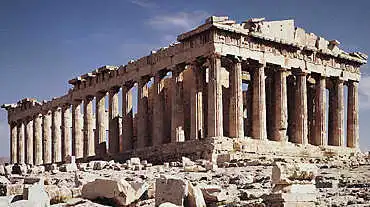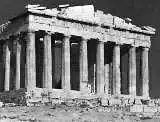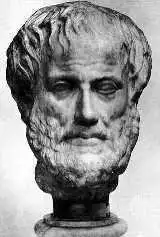Cosmos of the Ancients The Greek Philosophers on Myth and CosmologyTable of Greek PhilosophersChronology
Table of Greek philosophers bove is a simple table of the Greek philosophers treated above, giving their year of flourishing, their teacher, and a keyword to what type of theory they had regarding the gods and the myths about them.
bove is a simple table of the Greek philosophers treated above, giving their year of flourishing, their teacher, and a keyword to what type of theory they had regarding the gods and the myths about them.
In many cases the year of their prime, as well as that of their birth and death, is rather uncertain if very much so, I have noted it with a question mark. Sometimes there is also uncertainty as to whether they actually were students of the teachers mentioned, but when this is generally assumed I have just repeated the information, and when it is doubted by the scholars, I have again used the question mark. Finally, regarding the keyword for their theory on the divine and its mythology, I have allowed myself to use my own interpretation, which has sometimes been easy enough, in other cases the result of deduction with more or less solid support. Question marks note such cases, where the support for a certain wording is weak indeed, but no other category would fit any better. Monotheistic signifies a view putting some kind of singular divine will at the top of it all, and accordingly lessening the importance of any other divinities, if not excluding them completely. Astronomical is the view where divine forces are not at all pictured as instrumental in the making or continued process of the world. Allegorical is the view which sees some more or less divine doings behind the myths and the gods mentioned in them, but not in the way they are recounted in those myths natural forces as well as divine principles are dressed in anthropomorphic costumes, but this does not necessarily mean that there are no divine beings at all. Mathematical is that type of theory which sees natural laws, much like the astronomical view, behind the creation and workings of the world, and in essence this type could easily be included among the astronomical ones, finding a world order independent of gods but nonetheless governed by universal principles. Misunderstandings are stated in many theories, also those given other keywords here, but when the term is used it signifies that nothing else is determined about the gods Hecataeus, sole representative of this theory, is not recorded with any more elaborate cosmological opinion, so it would not be inaccurate to enclose his view within those of allegorical nature. Atheistic is that theory which refuses to accept any divine superiority above, any gods handling the world, or any other divine principle ruling the order of the universe. Polytheistic is a view including a number of gods, not necessarily those of Homer and Hesiod, but mostly so, and therefore this is the theory being closest to the cosmology of those two writers, in the listing below. Nihilistic theory might very well be included in the atheistic group, though going much further than those, by stating that nothing certain can at all be said about such matters. Agnostic I call the view which is uncertain, questioning the existence of the gods, but not denying it, doubting their roles in the making of the world, but not deeming it impossible. Historical, finally, is the theory that the gods and myths about them have historical explanations, not divine at all, which is the principle of euhemerism.
By these definitions the statistics of the philosophers speak clearly. Out of 28 persons, only three are overall loyal to the mythology of Homer and Hesiod, being labeled polytheistic in the table below. As many as seven the largest group are atheistic, or eight if the nihilistic is included. To this group one would also be able to add the astronomical, mathematical and historical, giving little room for any gods, whereby it adds up to thirteen, almost half of all the philosophers included. The next to biggest group is the monotheistic, containing six names, and then the allegorical of four. It would not, from this simple table, be daring to state that the belief of the Greek philosophers in their gods was waning, if at all any stronger to begin with. They definitely both respected and utilized the myths, in most cases, but believe in them they did not.
© Stefan Stenudd 2000

The Greek Philosophers
AristotleIntroductionAristotle's LifeTimelineAristotle's PoeticsAristotle's CosmologyAbout CookiesMy Other WebsitesCREATION MYTHSMyths in general and myths of creation in particular.
TAOISMThe wisdom of Taoism and the Tao Te Ching, its ancient source.
LIFE ENERGYAn encyclopedia of life energy concepts around the world.
QI ENERGY EXERCISESQi (also spelled chi or ki) explained, with exercises to increase it.
I CHINGThe ancient Chinese system of divination and free online reading.
TAROTTarot card meanings in divination and a free online spread.
ASTROLOGYThe complete horoscope chart and how to read it.
MY AMAZON PAGE
MY YOUTUBE AIKIDO
MY YOUTUBE ART
MY FACEBOOK
MY INSTAGRAM
STENUDD PÅ SVENSKA
|
 Cosmos of the Ancients
Cosmos of the Ancients